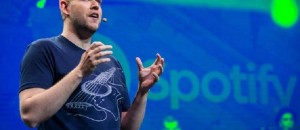Evan Spiegel begins a conversation in the offices of his startup, Snapchat, by propping a sneakered foot onto an Eames chair, leaning back, and acknowledging how infrequently he speaks to the press. “I literally have not done this in so long,” he says, before taking a sip from something called a Happy Juice—pineapple, pear, ginger, mint. When asked why, he chooses his words carefully. “I've been working,” he says. “This s— is hard!”
Spiegel is the co-founder, chief executive officer, and profane enfant terrible behind one of the largest and fastest-growing social networks on the Internet. At 24, he runs a startup with 330 employees and a valuation north of $15 billion, which claims more than 100 million mostly young users. He's also incredibly secretive about his business plans and an unknown (and arguably underestimated) figure in the intersecting gossip circles of Silicon Valley and Hollywood.
Now he's ready to talk about a major turning point for his company. More than three years after Spiegel founded Snapchat at Stanford with his fraternity brother, Bobby Murphy, 26, he's trying to turn it into a real business. After starting to run select video ads earlier this year, Snapchat is about to begin soliciting other big advertisers with some new numbers that assert its audience is bigger, younger, and more obsessive than anything on television. In a 23-page sales pitch it's sending to ad agencies this month, the company says more than 60 percent of 13- to 34-year-old smartphone users in the U.S. are active on the service and together view more than 2 billion videos a day. That's already about half the number of videos people watch on facebook, which is seven years older and has 10 times as many members.
“When Snapchat started out, I thought it seemed trivial. I was completely wrong,” says Chamath Palihapitiya, a former Facebook executive and high-tech investor who hasn't backed Snapchat but watches it closely. “I don't think anyone saw coming what they are building. At worst, they are the next-generation MTV. At best, they are the next-generation Viacom.”
Snapchat's ascent has been rocky. The company pioneered a new genre of online messages that disappear seconds after being opened. It suffered a series of public-relations crises caused, ironically, by the publication of internal deliberations and embarrassing old e-mails—the kind that never go away. In late 2013, Business Insider posted leaked video depositions of Spiegel and Murphy in a lawsuit, since settled, filed by a former Stanford classmate who had the original idea for messages that disappear and felt unfairly cut out of the company. Then there were the bawdy e-mails Spiegel had sent as a student to his fraternity at Stanford, leaked to Gawker and published online last May. Finally, there were the e-mails that came out in December in the hack of Sony's computer systems, which exposed secret deliberations about business strategy among Spiegel and Snapchat board members, including Michael Lynton, CEO of Sony Entertainment.
It all combined to give Spiegel a reputation as a cocky, misogynistic Los Angeles rich kid with entitlement issues. On top of that, he was considered egotistical and foolish for turning down a more than $3 billion all-cash acquisition offer from Facebook in late 2013, when Snapchat's revenue was zero dollars a year.
Yet as Spiegel pointed out in a circumspect commencement address he gave at the University of Southern California's Marshall School of Business on May 15, “Someone will always have an opinion about you. Whatever you do won't ever be enough. So find something important to you. Find something that you love.”
o now Spiegel is eager to set the record straight. Over the course of a 90-minute interview, he discusses books, business strategy, the millennial mindset, and the future of his closely watched company. This time, the overall impression is of an independent thinker who's taking the opposite path of many of his rivals not because he's full of himself, but because he believes that young Internet users are not well served by other for-profit social networks. He eschews data in decision-making, ignores design conventions with his app, and has placed his headquarters near the muscle beach in California made famous in the '70s by Arnold Schwarzenegger, among others. And his unconventional attitudes extend to advertising. “A lot of people look at Internet advertising as a tax on the system,” he says. “That's sort of discouraging if you care about making new products and especially discouraging if you feel like you can solve problems.”
Read more: Evan Spiegel Reveals Plan to Turn Snapchat Into a Real Business






